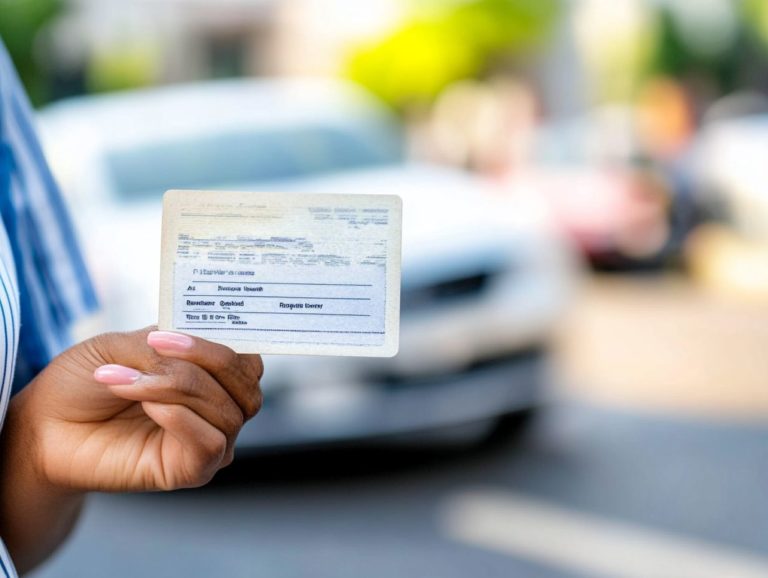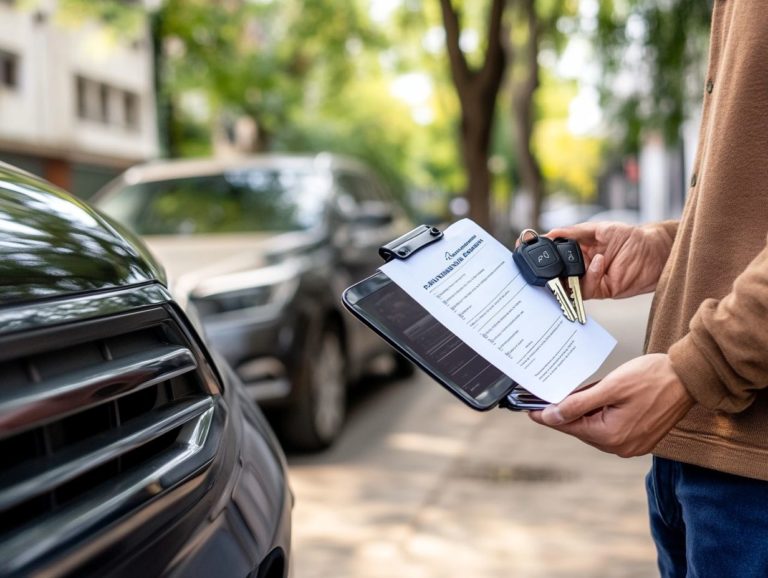How to Determine the Value of Your Car for Insurance?
When it comes to car insurance, grasping the valuation of your vehicle is absolutely essential. Whether you re in the market to buy, sell, or simply ensure you have adequate coverage, understanding your car s worth can significantly impact your experience.
This article delves into what car valuation truly means, highlighting the key factors that influence it and the various methods used to determine value. You ll find practical tips for preparing your car for valuation, as well as strategies for negotiating with insurance companies to secure a fair assessment.
Join us as we explore the intricacies of car insurance valuation, equipping you to make informed, confident decisions.
Contents
- Key Takeaways:
- Understanding Car Insurance Valuation
- Factors that Affect Car Value
- Methods for Determining Car Value
- How to Prepare for a Car Valuation
- Negotiating with Insurance Companies
- Frequently Asked Questions
- How do I determine the value of my car for insurance?
- What is an online valuation tool and how does it work?
- Is it necessary to consult with a professional appraiser?
- How can researching similar cars for sale help determine my car’s value?
- What factors affect the value of my car?
- Do I need to update my car’s value with my insurance company?
Key Takeaways:

- Understand the concept of car valuation for insurance purposes and its importance in determining the coverage and premiums.
- Consider factors such as age, mileage, condition, and market demand and supply when determining the value of your car.
- Utilize methods such as Blue Book value and professional appraisal, and prepare by maintaining cleanliness and keeping proper documentation for a fair valuation from insurance companies.
Understanding Car Insurance Valuation
Understanding car insurance valuation is essential for you as a vehicle owner, especially when navigating the intricate landscape of insurance claims. Several factors come into play, including the cash value of your vehicle, which can greatly affect the insurance payout in the event of a total loss.
Insurance companies typically depend on assessments by claims adjusters who evaluate your vehicle s condition, market value, and depreciation trends. These evaluations ultimately shape the overall car value, often referenced against standards like Kelley Blue Book and other reputable resources.
What is Car Valuation?
Car valuation means figuring out how much your car is worth, influenced by factors like age, mileage, condition, and market demand. Insurance companies rely on this valuation to pinpoint the cash value in the event of a total loss, making sure you get the best deal possible when it s time to settle your claim!
These companies often employ assessment methodologies, such as comparing prices of similar cars in your area, examining the sale prices of similar vehicles. This approach allows them to distinguish between cash value essentially, your vehicle s market value minus depreciation and replacement cost, which is the amount needed to acquire a new equivalent vehicle.
Knowing fair market value can make a big difference; it ensures that all parties can agree on a reasonable sale price. This knowledge is vital for navigating settlements and negotiations during insurance claims, enabling you as a vehicle owner to make smart choices about your insurance options.
Factors that Affect Car Value
Several key factors play a pivotal role in determining the value of your car, including depreciation, vehicle condition, and market demand.
The depreciation rate, which varies significantly depending on the make and model, is crucial in assessing how much value your car loses over time. Accident history, mileage, and modifications also shape your car’s overall worth in the used vehicle market.
Understanding these elements can enable you to make wise decisions about your investment.
Age, Mileage, and Condition
The age, mileage, and condition of your vehicle are crucial factors in determining its market value. As vehicles age, they generally undergo depreciation, and higher mileage often leads to increased wear and tear, impacting the overall condition and, ultimately, the resale value.
This drop in value can really affect your choices when selling, as many buyers lean on industry standards and resources to assess a used vehicle’s worth. A well-maintained vehicle with lower mileage not only retains a higher market value but also tends to deliver better reliability something you definitely want to prioritize.
Wondering how to keep your car’s value high? Regular maintenance, including oil changes, brake checks, and tire rotations, can significantly reduce wear and tear, extending the lifespan of your vehicle and protecting its resale potential. By taking proper care of your vehicle, you can reap financial rewards when it comes time to sell, highlighting the importance of proactive vehicle maintenance.
Market Demand and Supply

Market demand and supply dynamics are crucial in determining a vehicle’s value in the car industry. When demand for a specific make and model rises, expect its resale or trade-in value to increase significantly.
Conversely, an oversaturated market can lead to a drop in vehicle values. For instance, vehicles known for their reliability and performance, such as certain SUVs or compact cars, hold their value much better than those that lack popularity or versatility.
Several factors, like economic fluctuations and changing fuel prices, heavily influence these value dynamics. In times of economic uncertainty, buyers often lean towards used vehicles that offer more affordability, boosting demand for specific segments.
The trend towards electric vehicles is changing expectations. Consumers increasingly seek efficient and eco-friendly options, further impacting the supply and demand equation in an evolving market.
Methods for Determining Car Value
You have several great ways to find out your car’s value, with the Kelley Blue Book being one of the most respected resources in the car industry. This tool offers estimated values based on key factors like the vehicle’s condition, mileage, and current market trends.
Seeking professional appraisals from certified third-party appraisers can also provide thorough evaluations. These appraisers consider aspects like accident history and aftermarket modifications, which are changes made to a vehicle after its sale, such as new parts or accessories.
Blue Book Value
The Blue Book value is a trusted benchmark for assessing the market value of vehicles. It offers insights from essential factors such as the vehicle identification number, make, model, year, and overall condition.
This value is crucial for anyone involved, whether a consumer or an insurance company, as it helps determine fair prices when buying, selling, or insuring vehicles. Understanding the Blue Book value helps you negotiate better deals and ensures you won t overpay.
Insurance adjusters often refer to this value when evaluating claims, ensuring settlement amounts are fair and reflect current market conditions. The Blue Book serves as a vital tool, bridging the gap between buyers and sellers, aiding you in making informed decisions in the automotive marketplace.
Appraisal by a Professional
A professional appraisal from a certified third-party appraiser provides an in-depth evaluation of your vehicle’s condition and value. This is an important step, especially for complex insurance claims or high-value vehicles.
The process typically involves a meticulous inspection and analysis of various factors that influence your vehicle’s worth, delivering an objective assessment that aids in negotiations with insurance adjusters.
This evaluation covers components like age, mileage, and condition. The appraiser will also consider any modifications your vehicle has undergone, its service history, and comparable sales in your area.
By adhering to established methodologies, professionals ensure that the valuation is fair and comprehensive. Their insights enhance communication among all parties involved and serve as a vital tool in substantiating your claim, leading to a resolution that reflects your vehicle’s true value.
How to Prepare for a Car Valuation
Preparing for a car valuation requires a thoughtful approach to achieve an accurate assessment of your vehicle’s worth. Prioritize maintaining your car’s condition while gathering essential documentation, like service records.
Addressing any repair costs or detailing your accident history before the appraisal process will significantly enhance your vehicle’s perceived value. Taking these steps can make a meaningful difference in the outcome of your valuation.
Cleanliness and Maintenance

Maintaining cleanliness and conducting regular maintenance on your vehicle are essential factors that influence its overall condition and value.
A well-maintained vehicle significantly reduces depreciation and enhances its appeal during the valuation process.
Routine practices like washing, waxing, and vacuuming keep your vehicle in top shape. Regular detailing not only keeps your vehicle looking pristine but also protects the paint and finishes from wear and tear.
Following a recommended maintenance schedule for oil changes, tire rotations, and brake checks can further enhance your car’s longevity and performance.
Don t wait start keeping detailed records of your maintenance today! This documentation serves as a testament to your car’s upkeep and can improve its resale value.
Simple actions, like using high-quality cleaning products and addressing minor repairs promptly, can make a substantial difference in preserving your vehicle s worth over time.
Documentation and Records
Having thorough documentation and records is absolutely essential when you re gearing up for a car valuation. This clear history of your vehicle s maintenance and any accident occurrences plays an important role.
Proper documentation assists insurance adjusters and appraisers in accurately determining your vehicle’s worth, taking into account its condition and service history.
Various types of documentation can significantly enhance this process. Detailed service records that outline routine maintenance, repairs, and part replacements are invaluable.
These records showcase your commitment to keeping the car in top shape and provide potential buyers or appraisers with insight into the vehicle’s reliability.
A comprehensive accident history adds depth to the narrative, ensuring that any prior damages and repairs are disclosed transparently.
Well-organized records can streamline your insurance claims. They offer concrete evidence of the vehicle’s condition at different times, potentially leading to higher valuations and smoother transactions.
Negotiating with Insurance Companies
Negotiating with insurance companies is an essential skill, especially when you re aiming for a fair valuation of your vehicle after an accident or total loss.
By grasping the process of filing a claim and understanding your rights as a consumer, along with having a clear awareness of policy limits, you can confidently advocate for yourself and secure the insurance payout you deserve.
Unlock Your Car s True Value!
To secure a fair valuation for your vehicle, being well-prepared and informed is essential. Understand its worth and keep an eye on market trends.
Familiarize yourself with the claims negotiation process. Engaging thoughtfully with your insurance adjuster and presenting relevant data about fair market value can significantly bolster your case for an equitable insurance settlement.
Navigating this complex terrain effectively starts with thorough research on comparable vehicles in your area.
Resources like Kelley Blue Book or Edmunds can provide valuable insights into accurate pricing and market fluctuations, setting a solid foundation for your negotiations.
Meticulously documenting your vehicle’s condition through photographs and maintenance records will give you compelling evidence during discussions with the adjuster.
Clear and consistent communication is key. By asking relevant questions, you demonstrate an engaged and proactive approach, which encourages transparency.
Having a well-documented case, complete with pertinent examples, positions you favorably in the insurance discussion.
This ultimately fosters trust and clarity throughout the claims process, making your journey smoother and more effective.
Watch this video for expert tips on vehicle valuation.
Frequently Asked Questions
How do I determine the value of my car for insurance?

To find your car’s value for insurance, try online tools, consult an appraiser, or check similar cars for sale nearby.
What is an online valuation tool and how does it work?
An online valuation tool is a website or app that estimates the value of your car using data from various sources.
To get a valuation, simply enter your car’s make, model, year, mileage, and condition.
Is it necessary to consult with a professional appraiser?
If you own a unique or rare car, consulting a professional appraiser can be very helpful.
They can give you a detailed and accurate valuation of your specific vehicle.
How can researching similar cars for sale help determine my car’s value?
Researching similar cars for sale in your area helps you see what others are willing to pay.
This gives you a clearer picture of your car’s market value.
What factors affect the value of my car?
Several factors influence your car’s value, including age, mileage, condition, features, and market demand.
These elements can change, so reassess your car s value regularly.
Do I need to update my car’s value with my insurance company?
Yes, you should update your car s value with your insurance company if it changes significantly.
This ensures you have adequate coverage in case of an accident or theft.






